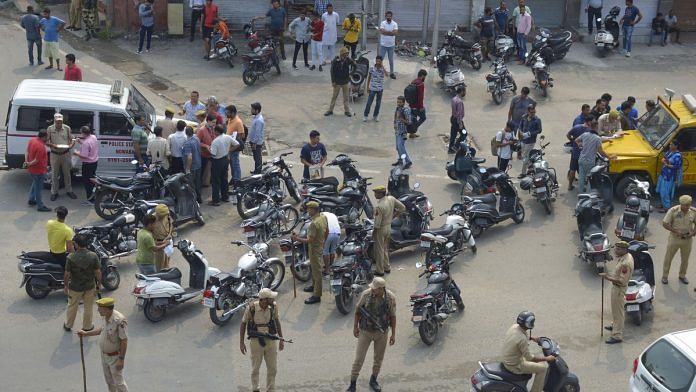India’s shock decision this week to revoke the autonomy of its restive state of Jammu and Kashmir is a crucial test for Prime Minister Narendra Modi. Without a change of course, he’s likely to fail.
Kashmir is arguably the worst legacy of the fratricidal partition of British India in 1947. One of more than 500 princely states in the subcontinent at the time, its Hindu ruler cast his lot with India after tribal fighters from Pakistan attempted his overthrow. The two nations have since fought three wars over the overwhelmingly Muslim territory. India controls the bulk of the state; Pakistan administers about a third and China claims a portion of its Himalayan plateau.
How India treats its portion of Kashmir matters for two reasons. One is that the state is the primary flashpoint for the world’s most dangerous nuclear rivalry; terrorist attacks there have repeatedly brought India and Pakistan to the brink of hostilities. It’s also the lone Muslim-majority state within Hindu-majority India, and thus an essential test of the country’s diversity and tolerance.
Given these sensitivities, Modi’s government might’ve approached the matter with discretion. Quite the opposite. With no warning, it revoked Article 370 of the Constitution of India, which granted Kashmir a degree of autonomy, while breaking up the state into two “union territories” largely controlled from New Delhi. Authorities placed hundreds of local leaders under house arrest, dispatched thousands of troops to the already heavily militarized state, evacuated tourists, imposed a curfew, and cut off communications links. The parliamentary maneuvers the government used to ram through its decision were so dubious they’ve already landed before the Supreme Court.
All this hardly needed doing: Most of the special privileges afforded to the state on paper had long been whittled away in practice. Nor is anyone challenging the unique rights enjoyed by some other states in India. The clear implication is that Modi’s Hindu nationalist Bharatiya Janata Party was intent on eliminating rather than celebrating a Muslim-majority state.
Also read: How the Budget session has cemented Amit Shah’s position as No. 2 in Modi govt
Changing Kashmir’s status won’t do anything to ease tensions with Pakistan. To the contrary, it will further empower the Pakistani military, long the main roadblock to peace on the subcontinent. India desperately needs a real strategy to engage with Pakistan, commercially as well as diplomatically. Instead Modi’s government seems convinced it can continue to ignore, isolate and deter its rival. One result is that trade between the two countries has now broken down entirely.
Perhaps most galling, though, is that Modi neglected to bring on board those Indians with the greatest stake in his decision: Kashmiris. BJP officials insist that closer integration will improve the lives of Kashmiris by opening the floodgates to jobs and investment, but this is questionable. (Private investment in India hit a 14-year low earlier this year, while unemployment stands at a 45-year high.) In any case, a sudden influx of outside businesses would fuel paranoia and resentment among locals, as it has wherever else such policies have been tried.
The issue India ultimately needs to address in Kashmir isn’t a lack of jobs, or even Pakistan-sponsored terrorism. It’s the lack of agency felt by too many Kashmiris, exacerbated by a suffocating security presence they view as an occupation. Forcibly imposing the central government’s will over the state will only intensify those grievances.
Democracies as large and heterogeneous as India cannot escape internal tensions. But the way to relieve such pressure is to decentralize power and give citizens a greater stake in their governance, as well as more control over local resources.
Modi’s government is heading in the opposite direction in Kashmir. Until India finds some way to make Kashmiris feel like full citizens, in control of their lives and their destinies, their land will remain what it has been for far too long: a troubled place, and a threat to peace and prosperity.
Also read: Terrified, worried & restless, Kashmiris struggle to connect with families back home




With all the autonomy and appeasement till now, where is Kashmir now? Has it grown economically? Has it capitalized it natural beauty and became a tourist destination? Has it enabled industries to grow and thrive?
Instead just terrorism, more demand for appeasement and more compliants. Now with more tighter integration hope is that development would come thorugh and Kashmiris would be able to participate in economic activity and gain employment and not be disaffected anymore. Further, which country allows a “nation” within its border to have its own flag?
There is always a difference between how we see ourselves and how the world sees us. Bloomberg View or the Editorial Board of the NYT are expressing a point of view. It could be affected by prejudice, although one would say the West is naturally inclined to wish India well, see it succeed. Taken in its totality, when so much of international media commentary and reporting turn critical, that should be a cause for concern and course correction. In normal times foreign commentators have the virtue of greater objectivity. At a time when so much of our own media has turned pliable and compliant, all the more reason to follow more closely what the world makes of us.
“With no warning, it revoked Article 370…”
Not correct. It was in the BJP’S election manifesto. I reckon some people have reason to be surprised when politicians actually deliver on their promises!